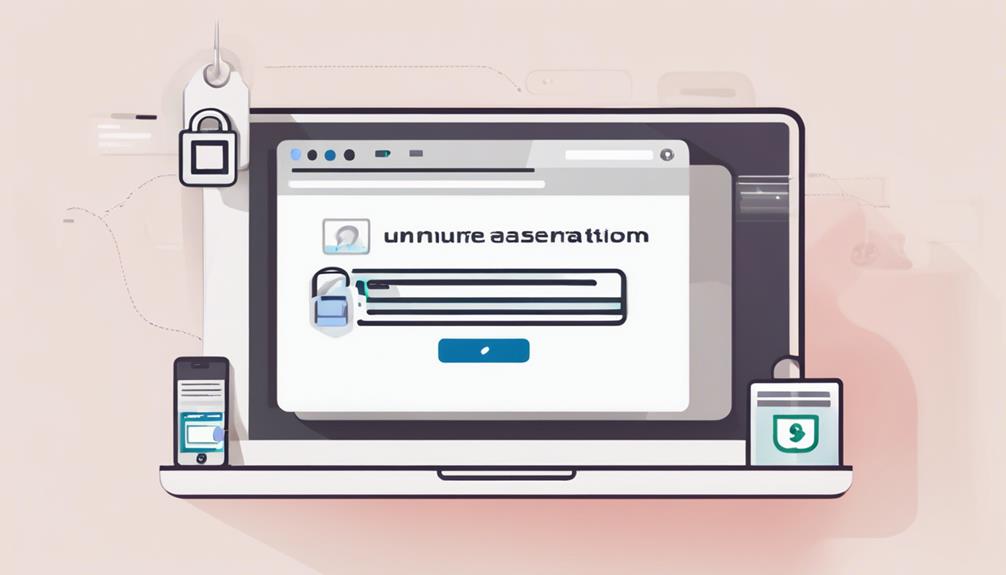To secure ecommerce product data entry effectively, you must adopt robust security measures that go beyond just the basics. By understanding the intricacies of data encryption, access controls, and staff training, you can create a shield against potential breaches and cyber threats. But remember, the evolving landscape of cybersecurity demands constant vigilance and adaptation. Stay tuned to discover the essential steps needed to fortify your ecommerce product data entry processes and protect your business from vulnerabilities lurking in the digital realm.
Data Security Risks
Highlighting the paramount importance of data security in ecommerce operations, the risks associated with inadequate protection mechanisms cannot be overstated. Cybersecurity threats loom large in the digital landscape, posing a significant risk to ecommerce businesses. Data breaches can result in severe financial losses, damage to reputation, and legal consequences. Prevention measures are crucial to safeguard sensitive customer information and maintain trust.
To mitigate cybersecurity threats, robust data breach prevention strategies are essential. Implementing encryption protocols, multi-factor authentication, and regular security audits are effective measures to enhance data security. Educating employees on best practices for handling sensitive data and conducting regular cybersecurity training can also bolster defenses against potential breaches.
Vigilance and proactive measures are key in the ongoing battle against cyber threats in ecommerce. By staying informed about the latest cybersecurity trends, promptly addressing vulnerabilities, and continuously improving security protocols, ecommerce businesses can strengthen their defenses and protect valuable customer data from malicious actors.
Implementing Security Measures
To enhance the security of your ecommerce product data, consider implementing data encryption methods to safeguard sensitive information. Establish user access controls to regulate who can view, edit, or delete data within the system. Conduct regular security audits to identify vulnerabilities and ensure that your security measures are up-to-date and effective.
Data Encryption Methods
Securing your ecommerce product data is paramount in today’s digital landscape, and employing robust data encryption methods is an essential aspect of safeguarding sensitive information. Encryption techniques play a crucial role in ensuring data protection and maintaining data privacy during secure transmission processes. By utilizing strong encryption algorithms, such as AES (Advanced Encryption Standard) or RSA (Rivest–Shamir–Adleman), you can encrypt product data before it is transmitted over networks, making it unreadable to unauthorized parties.
Implementing end-to-end encryption ensures that data is protected throughout its entire journey, from the point of entry to its destination. This method guarantees that only authorized users with the decryption key can access and decipher the information. Additionally, utilizing SSL/TLS protocols for secure communication channels further enhances data security during online transactions.
User Access Controls
When implementing security measures for user access controls in ecommerce product data management, it is essential to establish stringent protocols to regulate user permissions and restrict unauthorized access.
- Role-based Permissions: Assign specific roles to users based on their responsibilities and restrict access to data accordingly.
- Access Restriction: Implement access controls to ensure that users can only view, edit, or delete data that is relevant to their role.
- Regular Review of Permissions: Conduct periodic reviews to ensure that user permissions are up-to-date and aligned with their current roles.
- Two-Factor Authentication: Enhance security by requiring users to authenticate their identity through multiple verification methods.
Regular Security Audits
Regular security audits are crucial for maintaining the integrity and effectiveness of your ecommerce product data management system. Conducting vulnerability assessments and security testing on a regular basis helps identify potential weaknesses in your system that could be exploited by malicious actors. By staying proactive with these audits, you can address any vulnerabilities promptly and ensure that your data remains secure.
In addition to identifying vulnerabilities, regular security audits also help ensure that your ecommerce platform meets compliance requirements and undergoes thorough risk assessments. Compliance requirements are continuously evolving, and conducting regular audits can help you stay ahead of any changes that may impact your business. Furthermore, risk assessments conducted during these audits can help you understand the potential threats your system faces and take appropriate measures to mitigate them.
Using Secure Data Entry Platforms
To enhance the security of ecommerce product data entry, utilizing secure data entry platforms is crucial. These platforms offer robust features that ensure sensitive information is protected throughout the data entry process. Here are some key benefits of using secure data entry platforms:
- Secure Data Transfer: Encrypted data transfer protocols safeguard information as it moves between the user’s device and the platform.
- Data Privacy Controls: Advanced privacy settings enable businesses to control who can access and modify product data, enhancing overall data security.
- Access Management: Role-based access control mechanisms restrict unauthorized access to product data, reducing the risk of data breaches.
- Audit Trails: Detailed logs and audit trails track all data entry activities, providing transparency and accountability for every change made to product information.
Staff Training on Data Security
To ensure the security of ecommerce product data, staff training on data security is essential. This training equips employees with the knowledge and skills necessary to handle sensitive information securely. Providing an overview of data security importance and various training methods can significantly enhance your team’s awareness and competence in safeguarding valuable data.
Data Security Importance
Ensuring the security of your ecommerce product data is paramount in today’s digital landscape. It is crucial to implement robust security protocols to safeguard your data from potential breaches. Here are some key points highlighting the importance of data security:
- Protection: Data security measures protect your ecommerce product data from unauthorized access.
- Trust: Implementing strong security measures builds trust with your customers, assuring them that their information is safe.
- Legal Compliance: Adhering to data security standards ensures compliance with laws and regulations, avoiding costly penalties.
- Reputation: A data breach can severely damage your business’s reputation, making it essential to prioritize security.
Training Methods Overview
Amidst the ever-evolving landscape of ecommerce, training your staff on data security is a critical component of safeguarding sensitive information and maintaining the integrity of your business operations. To ensure your team is well-equipped to handle data securely, consider implementing practical exercises and interactive workshops. Practical exercises provide hands-on experience in identifying and responding to potential security threats. These exercises can simulate real-world scenarios, allowing your staff to practice applying data security protocols effectively. Interactive workshops offer a collaborative environment where employees can engage with experts, share knowledge, and receive immediate feedback on best practices for data security. By combining practical exercises with interactive workshops, you can create a comprehensive training program that enhances your staff’s understanding of data security measures and equips them with the skills needed to protect sensitive information effectively. This proactive approach to staff training is essential in fortifying your business against potential data breaches and maintaining customer trust.
Handling Data Backups Securely
Regularly backing up your ecommerce product data is crucial for ensuring the security and integrity of your business information. To handle data backups securely, consider the following:
- Implement Cloud Storage: Utilize cloud storage services for secure and scalable backup options.
- Enable Remote Access: Ensure that backups can be accessed remotely for efficient data recovery.
- Automate Backup Processes: Set up automated backup schedules to consistently protect your data.
- Encrypt Backups: Use encryption to secure your backups and prevent unauthorized access to sensitive information.
Managing Data Access Controls
To effectively safeguard your ecommerce product data, managing data access controls is paramount. Implementing role-based access ensures that only authorized individuals can view or manipulate sensitive information. By assigning specific roles and permissions, you can limit the access of employees to only the data necessary for their tasks, reducing the risk of unauthorized access.
In addition to role-based access, data monitoring plays a crucial role in enhancing security. Monitoring user activities within the system can help detect any suspicious behavior or unauthorized access attempts. Regularly reviewing access logs and monitoring data usage patterns can aid in identifying potential security breaches at an early stage.
Implementing Data Encryption
When it comes to securing your ecommerce product data, implementing data encryption is a critical step in safeguarding sensitive information. Encryption techniques play a vital role in enhancing data protection strategies and ensuring the confidentiality and integrity of your data. Here are some key points to consider:
- Use Strong Encryption Algorithms: Implement robust encryption algorithms such as AES (Advanced Encryption Standard) or RSA (Rivest-Shamir-Adleman) to secure your product data effectively.
- Secure Data in Transit: Utilize SSL/TLS protocols to encrypt data transmitted between your ecommerce platform and customers, preventing interception by malicious parties.
- Protect Stored Data: Encrypt stored product data using methods like data-at-rest encryption to safeguard information on your servers or databases.
- Key Management: Establish proper key management practices to securely generate, store, and rotate encryption keys, enhancing overall data security.
Frequently Asked Questions
Can Data Entry Errors Compromise Data Security?
Data entry errors can indeed compromise data security. Ensuring data entry accuracy is crucial for effective data breach prevention. Remember, a single mistake can open the door to potential breaches. Stay vigilant and prioritize accuracy.
How Often Should Data Security Measures Be Updated?
Regularly update data security measures to stay ahead of evolving threats. Importance lies in monitoring vulnerabilities constantly. By proactively addressing weaknesses, you can safeguard sensitive information effectively and maintain a robust defense against potential breaches.
Are There Specific Security Measures for Mobile Data Entry?
When entering data on mobile devices, ensure encryption methods are in place to protect information. Implement secure authentication measures, like biometric recognition or two-factor authentication, to prevent unauthorized access. Safeguard your data with these practices.
What Steps Can Be Taken to Prevent Insider Threats?
To prevent insider threats, ensure robust employee training and monitoring. Implement strict access control and encryption protocols. By educating staff on security risks and monitoring their actions, you can enhance data protection in your ecommerce operations.
Can Data Backups Be Stored Off-Site for Added Security?
Yes, data backups can be securely stored off-site using cloud storage. Implement encryption methods to safeguard sensitive information. This approach enhances security by protecting data both at rest and in transit, reducing the risk of unauthorized access.




